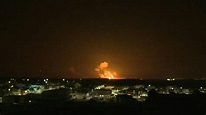Featured
article
- Get link
- X
- Other Apps
Gulf States Brace for Fallout as U.S. Strikes Iranian Nuclear Facilities

Gulf nations were placed on high alert Sunday following a dramatic escalation in regional tensions after the United States launched airstrikes on Iran’s key nuclear sites. The strikes, which President Donald Trump described as having “obliterated” Iran’s facilities at Fordow, Natanz, and Isfahan, mark a significant turning point in the ongoing conflict between Iran and Israel.
The U.S. action, coordinated with Israel, has raised fears of a broader conflict engulfing the Middle East. Gulf countries such as Saudi Arabia, Bahrain, and Kuwait—home to major U.S. military installations—have ramped up emergency preparedness. Bahrain activated its national emergency plan, advised citizens to avoid unnecessary travel, and instructed 70% of government employees to work from home.
While nuclear authorities in Saudi Arabia and the UAE reported no signs of radioactive contamination, the psychological and geopolitical shockwaves are reverberating. Iran has vowed to defend its sovereignty, warning of “everlasting consequences” if provoked further.
Regional analysts warn that the direct involvement of the U.S. could drag Gulf states deeper into the conflict, despite their efforts to mediate and maintain stability. As tensions mount, the world watches closely for Iran’s next move—and whether diplomacy can still find a foothold in a region on the brink.
Popular Posts
Midnight Blast Shakes Gaza Skyline Amid Rising Tensions
- Get link
- X
- Other Apps
Trump's Six Words: "I'm Going to Stop the Wars"
- Get link
- X
- Other Apps



Comments
Post a Comment